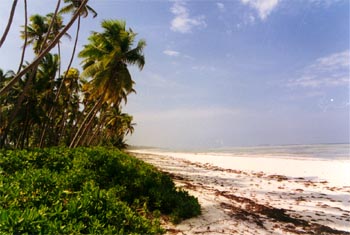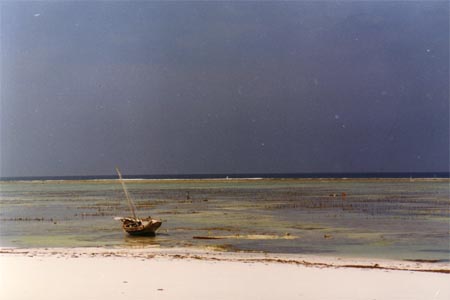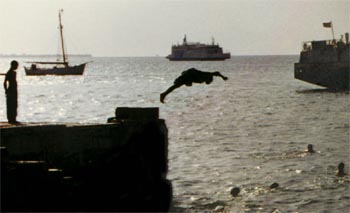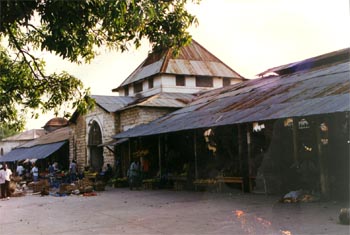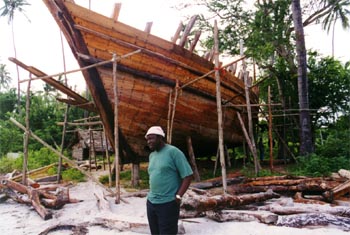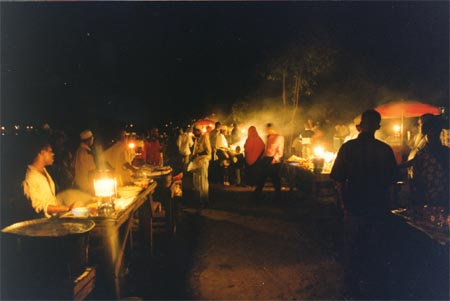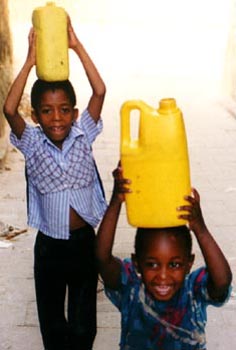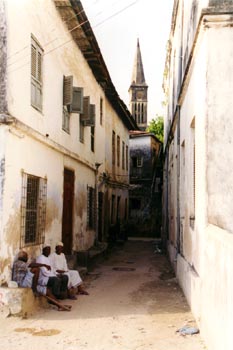
. . . LAND ROVER OVERLAND EXPEDITION
| Home | |
|
Journals
|
|
|
VALUED SPONSOR |
|
Into the Margins Sleeping inside a Land Rover in the middle of the
jungle can be unsafe. Doing it next to a town of unemployed desperados
is a stupid risk... Commercialism is insistent, creeping
into the cracks of indecision, sophisticated. To survive in the First
World we develop mechanisms to deal with the overwhelming quantity of
choices. If you want something on your bread you have to pick; jam, preserves,
nut spreads, Marmite, margarine, peanut butter, cream cheese, butter � and
then refine your choice; which brand, what size, low fat, low cal, squeezable,
plastic, glass. Think about it, when you pick Jif peanut butter
you�ve chosen from over a hundred different options, and if the store
is out of Jif you can make do with Skippy or Kraft. But on the ragged
edge of civilization, all the options are stripped away � suddenly you
are outside comfort zone� into the margin. I�d been coddled
by the southern Africa countries of my trip and shot into the guts of
the real Third World unprepared. The next three weeks were a struggle
just to keep going, to find food, shelter, petrol � the margin between
comfort and ruin. Zambia Zambia curls around the south-eastern
tip of Congo and is bordered by Angola to the west, Zimbabwe and Mozambique
to the south, and Malawi to the east. It's a relatively large country
of 752,615 sq km with a population of about 10 million - an unusually
low density for a developing country. Colonized as Northern Rhodesia
during the mad scramble at the beginning of the century, it received
far less infrastructure than Zimbabwe (Rhodesia) to the south - although
the copper mines in the northwest attracted special attention. It followed
a depressingly predictable course after independence - the copper mines
were nationalized, export income was siphoned, corruption flourished
and the infrastructure crumbled. Amazingly in 1990 the ruling party
with its resident Big Man lost in the elections. Even more amazingly,
he stepped down gracefully. The newly elected president Chiluba embarked
on a campaign to restore the country's fortunes - but had to accept some
bitter medicine in the process. Domestic spending was slashed to halt
inflation and the standard of living of the populace got worse not better.
After almost ten years in power, Chiluba seems to have turned the corner.
The mines were recently sold to a foreign consortium that promises to
invest the requisite millions to make them profitable again. A market
economy has been restored and the IMF and World Bank have tangibly applauded
Chiluba with a package of loans that will hopefully increase the local
standard of living. I was stopped a dozen times at checkpoints
on the road, and each time was pleasantly surprised at the efficiency
and lack of bribe requests. In our conversations Richard had mentioned
that Chiluba recently appointed a Minister of Revenue from New Zealand
and replaced almost every senior manager with western replacements. Within
one month the amount of collected revenue tripled, testament to the crippling
effects of institutional corruption. Zambia is back on its way up � although
the jury is still out as to whether Chiluba will subject himself to free
and fair elections. Rough Reality There was a long way to go and a
highway newly paved with foreign aid, but the truck had developed a high-speed
vibration and couldn�t get past 100kph. A long expensive stop to
balance all four wheels made no difference, and by early afternoon the
road had degenerated into a bone crunching ordeal. I beat through
the heat of the day - the A/C quit working. Night finally dropped
its cool blanket. I siphoned the last of my petrol from the roof jerry
cans and gave my granola to a hungry guy who had stopped to watch. Beating
into the moonless night watching the gas gauge fall I started feeling
pretty vulnerable. Finally I reached Mpiki and a 24hr BP gas station,
thank goodness for capitalism. Gas stations are the leading economic
indicators in African, the first signs of a stirring economy are the
shiny BP or Shell stations in the middle of mud hut towns. The first Swahili I'd heard on the
trip, a safe brightly lit oasis and gas for my three tanks � I was so
happy that I filled everything. Belatedly I realized that I didn't
have enough Kwacha. "No we've never taken credit cards. No, traveller's
cheques aren't accepted in the country. No. No. Cash only." No banks,
no ATMs, no moneychangers, I�d been told to travel with lots of US cash
but southern Africa had lulled me. I'd dived into real Africa from
the vestiges of civilization and this was to be my induction into Survival. Noel Sikaumbwe, night attendant,
pondered my problem. Yes he would accept 20 litres back if I siphoned
them out of a jerry can. That left me owing 5,000 kwacha - $2.50. No
solution could be found. I tried selling some of my food to passing motorists.
Noel sympathised. Finally he offered to pay the remainder, a touching
gesture since 5,000 kwacha represented a week of his salary. Would I
like to park the truck and sleep at the station? I would. The
New African Class Noel cautioned me as I bedded down
in the Land Rover, "When the soldiers come, tell them you have talked
to the owner." At 2am there was shouting from the night patrol outside, "Hey,
hey you, wake up, what are you doing?! Get out of the truck. You're driving
where? All this way! Oh you are from Canada. Well drive safe." Mackson
the night guard was an inscrutable presence throughout the night. In the morning Noel and Mackson let
me sleep in till 5:30, then we shared tea. Mackson approached me gravely
and asked if I had a clean piece of paper - he had saved the tea bags
and would take them home to his wife. I gave him the package of 25. He
looked quite astonished and recovered to thank me solemnly. I gave Noel
a can of Milo, a box of cookies, and a box of granola bars � hopefully
he would be able to sell them for more than 5,000 kwatcha. We left
friends. Another six hours of bumping to arrive
at Mpulungu, the end of the road - literally. The road goes through the
tiny port and ends at Lake Tanganika, the lake of my youth. Seeing it
again jogged years of memories and I couldn't wait to take the boat to
Kalemie - my old home town. I was directed to the only campsite in town
and met Aseef, the camp owner. The boat wasn't coming till Friday, five
days away. No he didn't take travellers cheques but he could find a local
merchant who could exchange some for me. If I was going to Kalemie I
should talk with that woman there � she had just fled the fighting with
her family. Fighting?! I approached the woman and in halting Swahili
asked about Kalemie. "Oh you must not go, there is much trouble.
Yes there is fighting - many people have died." Change
of Plans I'd pushed hard to arrive in Nakonde
before 6pm in order to get across the border - the town had a reputation
as a wild border crossing with plenty of scams, crooks, thieves, and
killers. We made the town by 5:20 and tiredly but triumphantly I dropped
my passengers and went to the gate - closed - come back tomorrow. No
kwacha. Dangerous town. What to do? Noel had said that Zambia had no
history of internal violence, "We are a peaceful people." I
decided to head back into the country and make a jungle camp - preferring
natural dangers to manmade. 20km out I turned into the bush. Jungle
Camping Sleeping inside a Land Rover in the
middle of the jungle can be unsafe. Doing it next to a town of unemployed
desperados is a stupid risk, one that I had plenty of time to think about
as I scrunched sleepless in my metal and glass cocoon. I dreaded a sudden
face at the window in my peripheral vision. Midway through the moonless
night I thought I heard footsteps and felt numb with fear gripping my
pepper spray and American Tourister alarm. Blood pumped through my ears.
Fatigue finally overcame fear and I slept fitfully. Francis, one of the ragamuffins,
showed up the next morning and helped me consume my breakfast. As I re-tied
the roof-mounted jerry cans the soldiers arrived brandishing assault
rifles and I was hustled to the station. What was I doing? After my explanation
I was given a thorough lecture by the captain, "Next time you come
to the station and camp in the yard." No attempt at a bribe. Thoroughly
impressed I gave them $5 for "tea". Word spread quickly about
my exploits, "The mzungu was afraid to sleep in town so he slept
in the bush!" The other thing about Africa is that people are unafraid
to laugh at you - in front of you. Surrounded by twenty laughing cops
I had to join in - I returned to the border in style with an official
escort of three soldiers. My departure from Zambia was painless,
quick, efficient. Despite the potholes and the nights in the truck I
had fond memories of Zambia. I entered Tanzania. I entered a paradox. Immigration
required $50US cash for a visa - and no they didn't take travellers cheques.
I was stumped. The clerk generously gave me a seven day pass and told
me to pay at headquarters in Dar when I got more money - in retrospect
it would have been kinder if he had reached over the counter, slapped
me, and sent me 200km back into Zambia to the nearest bank. I moved over
to Customs, was ignored for 15min, filled out a form in quadruplicate,
signed and stamped by another clerk, in to see the "boss"... "So
tell me, how is the Microsoft case proceeding." I thought I was
finished - had to pay road tax, another form � another shack, another
clerk copied information from my papers to a ledger - another shack,
another clerk copied information from my papers to yet another ledger
- back to Customs to drop off the duplicates� and I could go. At
2 hours, it was my longest tangle with African bureaucracy - it was only
a warm up... One thousand kilometres cutting across
the waist of Africa with little sleep and precious few reserves of strength.
Long stretch to Iringa through mud hut towns with metal roofs touching,
decrepit mini-bus taxis hooting into crowds penned by tea shacks, darting
traffic. Cool afternoon air, belligerent bursts of rain, elephant grass
higher than the windshield, black tea at an Agip gas station kiosk looking
mournfully at the "very soon to be working" cappuccino machine. Darkness. I descend an escarpment
suddenly, corkscrewing down, slaughtering thousands of flying vermin,
the air turned tepid then musky. Stanley�s Hella high beams cut
holes through the jungle tunnel. Two lionesses feasting on an antelope
road kill spun around in the headlights and slunk off the road. I
blinked, the whole scene was surreal. Tea in a scrap board trucker stop
in Morogoro. Speeding ticket?! from a speed trap - the old twisty corner
50km temporary village slowdown ambush. Don't mind paying for "tea" but
a $10 ticket burns me! 50 clicks out of Dar the road turns nasty, and
I�m beaten up for the last hour. Arrived 1am, tired, hungry, lost � there
are precious few street signs in Dar. An attendant at a BP station
offered to guide me to a hotel and confided during the ride that it was
his first time to ride in a Land Rover. Paid $60 for one night
in a "Business Hotel" � filthy room, the shower head shot directly
onto the bathroom floor, remnants of the last tenant's dinner. I was
so tired I had to watch � an hour of World Match Play darts in order
to sleep. Desolation
in the Capital Tanzania is a very large country,
945,087 sq km, with a population over 30 million. The country is a paradox
in many ways. It was one of the purest attempts at African socialism,
the president Nyerere believed deeply in an agricultural economy and
made several attempts at it - unfortunately the country inherited the
bureaucracy and corruption that comes along with socialist central planning.
Tanzania can claim the credit for ridding Uganda of the infamous Idi
Amin. After Amin invaded their northern border the cash strapped country
scraped together an expeditionary force and routed "Africa's best
equipped, best trained army at the time", marching right into the
capital Kampala. Unfortunately they received no foreign assistance and
this $500million adventure further decimated the government�s coffers.
With the fall of communism, aid donors were no longer prepared to bail
out the economy in the face of widespread corruption "which just
about matched the amount of aid that was flowing into the country".
Multi-party elections were held, ministers were replaced, corruption
began to be addressed. Having complied with the "free
elections" and "freedom of the press", Tanzania is now
suffering through "controlled domestic spending". To put this
in perspective - it spends over 50% of it's annual budget on foreign
debt interest! There is over 80% unemployment in the major cities. Sitting
near the epicentre of the AIDS pandemic with a highly infected population
- it has less than $100 budgeted annually per person for health, which
is not even enough for an AIDS test - never mind treatment. There are
no bank machines in Dar. There are no supermarkets. I bought my own oil
for an oil change at the Land Rover dealer. The city huddles around the
flickers of foreign expenditures scattered here and there. Far from the "civilization" that
I had anticipated, Dar prolonged my labours in the margin. One travel
agency in town will issue travellers cheques - and one other exchange
bureau will exchange them for shillings - which can be converted into
US dollars � which can then be taken to Immigration to pay for the visa. But
what should have been a 10 minute process consumed two days! Mind numbing
lines, heedless clerks, endless duplication of paperwork - I was taxed
to my limit. My comrade in suffering was Samuel - a quiet Somali refugee
who was applying for a visa for his sister and had been queued quietly
in the suffocating hall for two weeks.... waiting. We joked, he told
me which clerks were best, and lent me his pen when I forgot the cardinal
rule of African bureaucracy - always bring a pen! I gratefully accepted
my stamped passport after the second day of sitting and sweating, and
waved to Samuel as I made my escape. Gem
of Africa - Zanzibar On one of my last nights after a
nice meal, the rain suddenly rolled in. Cool wind and then gusts of water
pressing down, stripping the heat from the sky. The ancient House of
Wonders shuddered beside the gleaming Arab fort, screened by palm trees.
Dhows bobbed on their liquid tethers and the tide nipped at the edges
of the pier. Vendors galped and laughed, berating assistants to hold
large plastic sheets over their wobbly kitchens. Tourists ducked into
their pools of light and departed with softly steaming morsels. And then
the clouds passed away and the night sky showed off a million diamond
drops glittering on the windows and laughing children. Lovers walked
by wrapped in their sentiments. Sitting at the edge of the ocean I felt
that I'd regained the center of things. Late tonight I pick up John Hiscock
and Alex Semple - my partners for a further exploration of Zanzibar,
ascent of Kilimanjaro, and discovery of Serengeti and Ngorongoro. My
solo tour is over for now - probably a good thing, I'm afraid I will
talk their ears off after so much silence. I hope this finds you well. |
All rights reserved
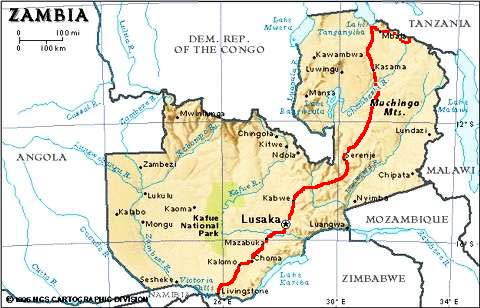
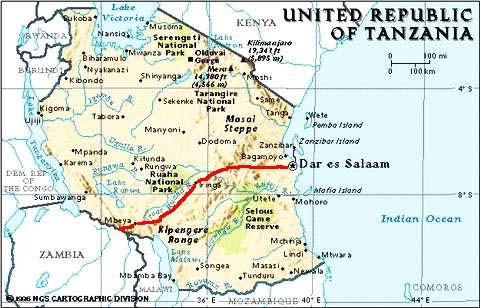 Struggling
through Tanzania
Struggling
through Tanzania